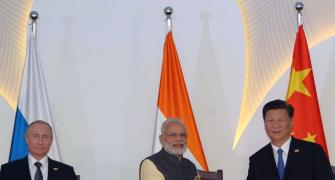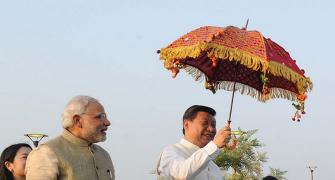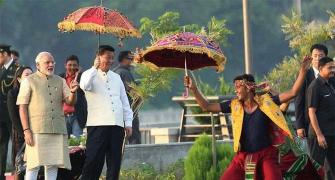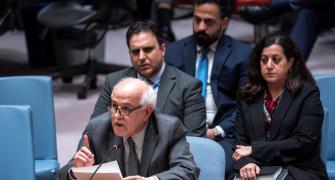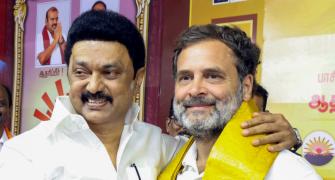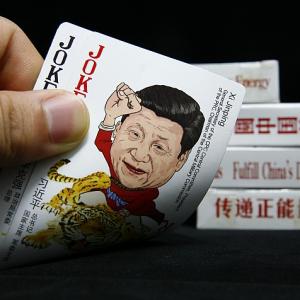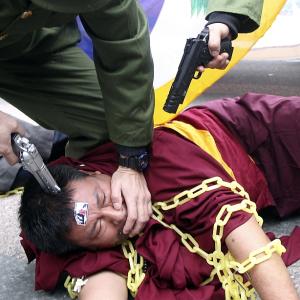'The title of 'core' of the leadership gives Xi Jinping greater political authority at a time when China is beset by various problems as well as a slowdown in economic growth,' points out former RA&W officer Jayadeva Ranade.
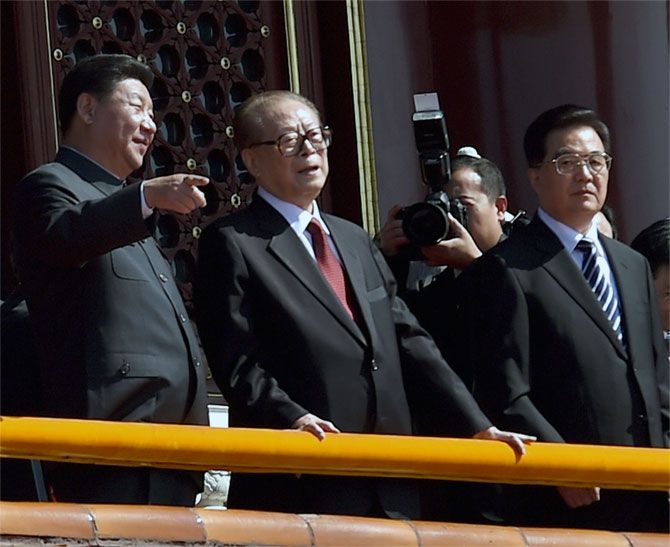
After four days (October 24-27, 2016) of deliberations at the military-owned Jingxi Hotel in Beijing, 197 full members and 151 alternate members attending the Sixth Plenary session of the Chinese Communist Party's 18th Central Committee under the chairmanship of Chinese President Xi Jinping agreed on October 27, 2016, that Xi Jinping would be designated the 'core' (he xin) of the Party Centre, or of the fifth generation leadership.
The decision, contained in the over 6,000-word Plenum document, however, seemed to clearly hold back from granting Xi unfettered authority by equally carefully emphasising 'collective leadership' and asserting that 'no party organisation or individual should suppress or undermine intra-party democracy.'
Interesting was the Plenum document's tenor, which continued the 18th Party Congress' emphasis on Party supremacy, Party discipline and stability.
It stressed strict observance of Party discipline and norms, using the term 'strict' at least 15 times.
There was indication that the campaigns against corruption and rectification of the Party would continue with the need for 'supervision' being stressed at least 40 times.
Coined by Deng Xiaoping, author of China's 'Four Modernisations,' the term 'core of the Party Centre' was at the time intended to reinforce the pre-eminent political authority of Jiang Zemin who had been brought in from Shanghai and appointed as party general secretary in the midst of the Tiananmen turmoil in June 1989.
Deng Xiaoping had then described Mao Zedong as the 'core' of the first generation of leaders, Deng himself as representing the 'core' of the second and Jiang Zemin as the 'core' of the third generation leadership.
Hu Jintao, in large part because of his differences with Jiang Zemin who was reluctant to yield authority even after retirement and exercised considerable influence till very recently, was not described as the 'core' of the fourth generation of leaders.
By ascribing the position of 'core' of the fifth generation to Xi Jinping, the Sixth Plenum decision has now affirmed Xi Jinping's decisive pre-eminent political status and placed him alongside Mao Zedong and Deng Xiaoping.
The effort to make Xi Jinping the 'core' of the fifth generation of leadership has been deliberate.
According to Wu Zhong of Asia Times, this was first suggested by Politburo member Wang Huning at a high level party meeting this January.
Most significant, however, was the statement made in August 2016 by Li Zhanshu, director of the central committee's powerful General Office and Xi Jinping's hand-picked confidante, who asked party cadres to 'staunchly... safeguard General Secretary Xi Jinping as the "core".'
This was followed by all five commanders of the People's Liberation Army's newly-created Military Zones pledging loyalty to Xi Jinping.
At least 15 provincial party secretaries have also endorsed Xi as the 'core' leader.
A propaganda effort to build Xi's image as the 'core' of the fifth generation was noticeable in the months preceding the Sixth Plenum.
There were references in articles in the State-controlled Chinese official media, including a call for a 'strong man' or 'Great Leader' on October 18, in the People's Tribune, which is affiliated to the Party's official newspaper People's Daily.
The following day General Liu Yazhou, political commissar of the PLA's National Defence University and a 'princeling' close to Xi, wrote in the propaganda department's journal Dangjian, asking for a 'mature and strong core of the leadership.'
The day the Plenum concluded on October 27, there was a more direct commentary in the People's Daily. It claimed that endorsing Xi as the 'core of the party centre' embodied the common wish of 'the party, the military, and all ethnic groups.'
The title of 'core' of the leadership gives Xi Jinping greater political authority at a time when China is beset by various problems as well as a slowdown in economic growth.
In the context of domestic politics, it affirms Xi Jinping's standing within the Communist party, diminishes challenges to his authority and will facilitate him to over-ride objections from other factional groupings.
It will strengthen Xi Jinping's efforts to rectify and reform the 88-million strong Communist party where 1 million members have already been punished, and push ahead with the campaign against corruption which has made him popular with the common man.
In a manner, the 348 members of the party's Central Committee have accorded their approval to the tough policies being implemented by Xi Jinping since the 18th Congress in November 2012.
To that extent the Sixth Plenum could facilitate Xi Jinping's attempts to induct cadres of his choice to the Central Committee , Politburo and Politburo Standing Committee at the 19th Party Congress next October-November when nearly 90 vacancies are anticipated to arise.
Interesting in the context of the Sixth Plenum's foreign policy implications is the assertion 'that the people of Hong Kong should not be allowed to stand up to the people.'
Its endorsement of Xi Jinping's policies since the 18th Congress, which includes China's assertive foreign policy, indicates there will be no change in China's stance on issues of sovereignty or territory.
Jayadeva Ranade,former Additional Secretary in the Cabinet Secretariat, Government of India, is presently President of the Centre for China Analysis and Strategy.

